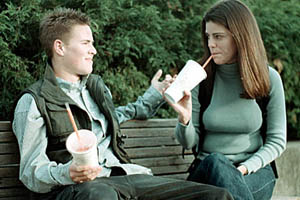back
Young and Middle-Aged Women Fuel Smoothie
Boom
by KAMIKA DUNLAP
 WHILE
FRESH STRAWBERRIES, bananas, orange sherbet, ice or nonfat frozen yogurt with
a boost of Ginseng may make perfect for a dessert beverage, Doris Iberico calls
it breakfast.
WHILE
FRESH STRAWBERRIES, bananas, orange sherbet, ice or nonfat frozen yogurt with
a boost of Ginseng may make perfect for a dessert beverage, Doris Iberico calls
it breakfast.
"I don't want to eat much,
but I do want to start my day healthy," said Iberico, 38, of Berkeley as
she took a seat on the bench outside of a crowded juice bar to drink her smoothie
and wait for her ride. "I think of smoothies as the future nutritional
fast food."
Smoothies, a California craze
once relegated to health restaurants and fitness clubs, have gone mainstream.
The smoothie industry is projecting
sales of more than $6 million this year, said Dan Titus, director of the Juice
Gallery, a research company in Chino Hills California that concentrates on specialty
retail foodservice.
"We're all conditioned
in the United States of America for a 'quick fix' and that's why vitamin sales
are huge," Titus said. "If people can get vitamins in their smoothies,
then it's natural to gravitate towards them."
The additions of boosts, or
vitamin supplements, in smoothies have made smoothies a symbol of health and
convenience.
So far, health-obsessed women
ages 15-45 are responsible for smoothies' popularity.
Rhondi Schigemura, who conducts
research and development trends on supplements for Jamba Juice, a San Francisco
based juice bar company, said college educated and professional women are the
company's primary consumers.
Women in that age range make
up the majority of the population and influence society's ideas about food and
health, she said.
In the world of boosts, however,
the American Nutraceutical Association (ANA) decides what's cool and uncool
for consumers.
"It's a self governing
type of industry," Schigemura said.
The two-year-old association
is made up of health care professionals and nutraceutical manufactures, which
provide information about vitamins and supplements.
 |
It is the ANA that sets the industry's standards
for manufacturing nutraceuticals.
The ANA is not associated with
the Food and Drug Administration that regulates pharmceuticals, Schigemura said.
Drinks blended with vitamins,
minerals, amino acids, and herbs are tested to determine the kinds of effects
it will have on the body, she said.
UC Berkeley Clinical Nutritionist,
Michelle Vivas said people who have diets largely composed of vitamin supplements
should be careful.
Vivas said sometimes companies
add multivitamins to their products to make the label look more impressive.
"It (multivitamin food
and drink) makes for pretty expensive urine," Vivas said. "Total health
comes from sleeping and eating right, not taking 19 different vitamins."
One popular vitamin often added
to smoothies is Ginko Biloba, a supplement mostly taken by the elderly to increase
blood flow to the brain. Many smoothie drinkers believe taking this supplement
will increase memory, Vivas said.
"Just because you receive
more blood flow to the brain doesn't increase your memory," she said.
Experts say some smoothie drinkers
often rely on ingredients in the shake to keep them in shape.
"People feel good about
putting something good into their bodies," said Iberico, a smoothie drinker
for five years.
"The society we live in
makes it easy to eat pizza and hamburgers and then pay money to fix yourself
up with a boost," said Jake Wollner, a manager at Frozen Fusion juice bar
in Berkeley.
Smoothies are not a substitute
for eating well, Vivas said.
"A multivitamin is not
going to improve a bad diet," she said.
Dina Michail, 22, a legal studies
major a UC Berkeley said, she goes to juice bars about once a week for an energy
boost.
"I don't know if it really
works," Michail said as she sipped her Energy Juice Boost . "I definitely
need some energy."
Still, for others like Sam Sims,
an Alameda County Behavioral Health Care Services counselor, who took a last
gulp of his strawberry banana blend, "Somtimes I don't believe that boost
stuff," he said. "I just drink them because they taste good."
back
 WHILE
FRESH STRAWBERRIES, bananas, orange sherbet, ice or nonfat frozen yogurt with
a boost of Ginseng may make perfect for a dessert beverage, Doris Iberico calls
it breakfast.
WHILE
FRESH STRAWBERRIES, bananas, orange sherbet, ice or nonfat frozen yogurt with
a boost of Ginseng may make perfect for a dessert beverage, Doris Iberico calls
it breakfast.
